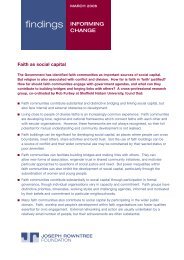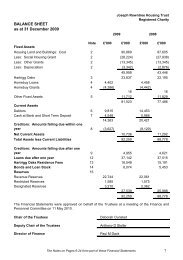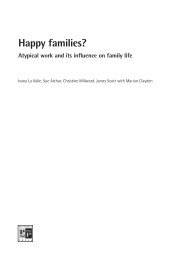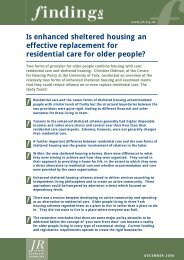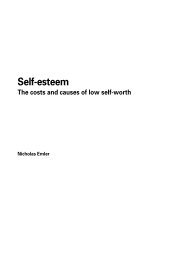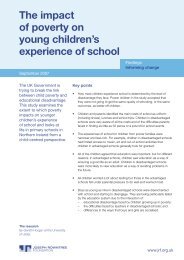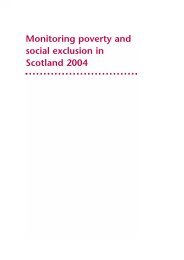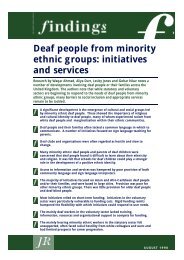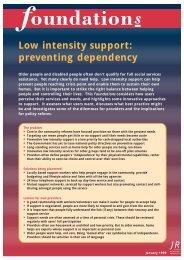Community participation - Joseph Rowntree Foundation
Community participation - Joseph Rowntree Foundation
Community participation - Joseph Rowntree Foundation
You also want an ePaper? Increase the reach of your titles
YUMPU automatically turns print PDFs into web optimized ePapers that Google loves.
Network dynamics: explaining the pattern<br />
around; for example, those with more wealth consume more products, which causes<br />
wealth to flow out to others in the network. But investments cause wealth to be<br />
concentrated, because those who get lucky then have more to invest and the chance<br />
to make even greater gains. It turns out that the concentrating ‘rich get richer’ effect<br />
produced by investments is always the stronger of the two and always cancels out<br />
the distributive effect that transactions might have. This is why the ‘trickle-down’<br />
economics fashionable in the US and the UK in the 1980s proved so wrong. 8<br />
What are the implications for community <strong>participation</strong> in governance? There is no<br />
reason to suppose that what is true of financial capital will not be true of social<br />
capital. 9 Our contention is that, in key respects, Bouchaud and Mézard’s ‘rich get<br />
richer’ model holds true for social capital too. Gaining linking social capital through<br />
<strong>participation</strong> in governance increases the likelihood of gaining more linking social<br />
capital. Participation confers benefits that do not necessarily ‘trickle down’ to nonparticipants.<br />
One plausible explanation for why this should be so is that the benefits of<br />
<strong>participation</strong> tend to take the form of ‘investments’ that concentrate social capital<br />
rather than ‘transactions’ that spread it around.<br />
First, participants invest in their human capital – their knowledge, skills and, crucially,<br />
the confidence in using them. ‘You don’t realise you’re changing’, said one<br />
interviewee, ‘but you do become more confident. You get used to questioning.’<br />
Another described how, at the first meeting of a new committee, she had had to<br />
explain what her community group was:<br />
I nearly had a heart attack. But I did it, I got through it, I came back and<br />
explained I’d done it and I felt more confident to do it again.<br />
One of the first things they learn is about the protocols of formal meetings (minutes,<br />
agendas, speaking through the chair and so on). Jim took on a governance role in<br />
the residents’ association because of his experience with running meetings in the<br />
local Labour Party. Brenda explained how, through her experience in different<br />
forums, she had learnt not to be outfoxed by jargon or pedantic rules about how and<br />
when to have her say. More subtly, participants learn about how the system really<br />
works – about navigating the organisational politics affecting decisions; about<br />
advocacy, negotiation, persuasion and deal making; above all, they learn the<br />
confidence to apply this knowledge and skill in governance settings. ‘Once you’re on<br />
the inside you learn how things work and that you can’t always get what you want’,<br />
says Tracey. ‘But the trick is to learn to compromise and fight your corner – I can still<br />
stand up for my principles.’<br />
39



